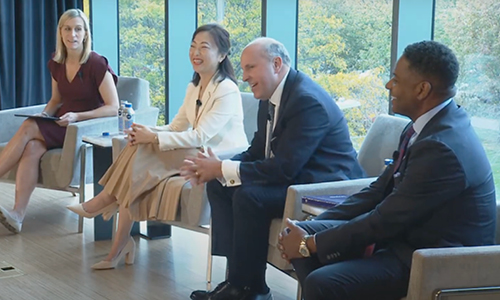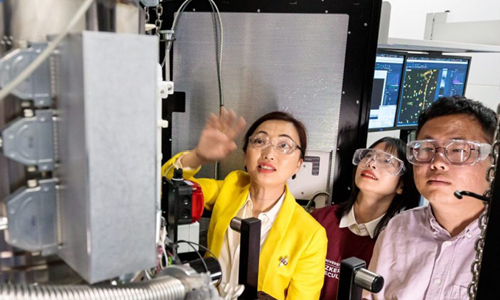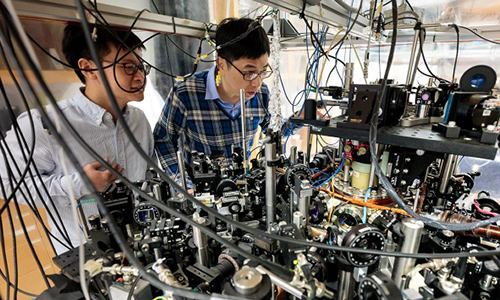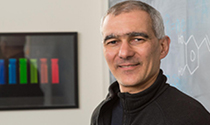|
|
|
|
| |
UChicago launches the Institute for Climate and Sustainable Growth |
|
| |
|
|
|
| |
“Climate change is the greatest risk to human well-being over the next century. It is not a problem in isolation,” says Michael Greenstone, LAB’87, the Milton Friedman Distinguished Service Professor in Economics. But approaches to this problem must also factor in “the need for growth and improvements in human well-being,” he says.
Greenstone serves as the founding faculty director of the University’s new Institute for Climate and Sustainable Growth. The interdisciplinary research hub merges technology, economics, policy, and education to address this global challenge with effective solutions. |
|
| |
|
|
|
| |
Uniting experts on sustainable solutions |
|
| |
|
|
|
|
|
| |
| |
|
|
| |
Founding executive editor of Cipher Amy Harder, molecular engineering professor Y. Shirley Meng, former Department of Energy Under Secretary for Science Paul Dabbar, and Exelon president and CEO Calvin Butler discuss the future of clean energy storage. |
|
| |
|
|
|
|
| |
|
|
|
| |
On October 30 the University of Chicago launched the Institute for Climate and Sustainable Growth to take on the intertwined challenges of climate change and economic prosperity. The new research institute brings together UChicago experts on energy policy, new energy technologies, and climate systems engineering to identify ways to meet those two urgent global needs.
Greenstone brings deep policy and economics expertise to his role as the institute’s faculty director. Molecular engineering professor Y. Shirley Meng and professor of geophysical sciences David Keith will lead the institute’s Energy Technologies and Climate Systems Engineering Initiatives, respectively, forming the scientific foundation of the institute’s work.
In addition to research, the institute will introduce the Chicago Curriculum on Climate and Sustainable Growth, designed to give students a global, experientially informed perspective on complex climate issues through the lenses of economics, technology, and policy. The curriculum has been developed for UChicago in such a way that eventually it can also be adopted by other universities.
At the launch event panelists from around the world—with an array of perspectives on climate change—discussed the power of investment in clean energy and the role that technological innovation can play in a greener future.
|
|
| |
|
|
|
|
|
| |
More about Institute for Climate and Sustainable Growth initiatives |
|
| |
|
|
|
| |
|
|
|
| Pore power: In Meng’s battery-focused lab, researchers have developed a new method to create multiple nanopores simultaneously within materials, which could improve techniques to extract the metals required for advanced grid-scale batteries. |
|
|
|
| |
|
|
|
|
|
| |
|
|
|
| A new frontier: Learn the ins and outs of climate systems engineering from Keith’s 2023 Big Brains podcast appearance, and read his own case for the emerging field of geoengineering in a New York Times op-ed. |
|
|
|
| |
|
|
|
|
|
|
|
|
|
| |
Building a “portfolio of batteries” |
|
| |
|
|
|
|
|
| |
| |
|
|
| |
From left: Shirley Meng and PME students Jing Wang and Haozhe Zhang look at an electron microscope at Argonne National Laboratory in 2022. Photography by John Zich. |
|
| |
|
|
|
|
| |
|
|
|
| |
Y. Shirley Meng, a leading expert in battery technology, heads the Energy Technologies Initiative within the Institute for Climate and Sustainable Growth. Storage is a key component of a sustainable future as economies shift to renewable energy sources. Meng, a professor at the Pritzker School of Molecular Engineering with a joint appointment at Argonne National Laboratory, and her team use imaging and computational modeling to diagnose battery weaknesses and to engineer solutions for electric vehicles, mobile devices, and quantum computers. |
|
| |
|
|
|
|
|
|
|
|
|
| |
| |
|
|
| |
Quantum state of mind:
Read about quantum mechanics and explore how the tiniest particles in the universe can have a big impact on the fields of physics, chemistry, computer science, and medicine at UChicago.
|
| |
|
|
|
|
|
| |
|
|
|
|
|
| |
| |
Sign up to receive µChicago monthly. |
|
|
|
| |
|
|
|
|





